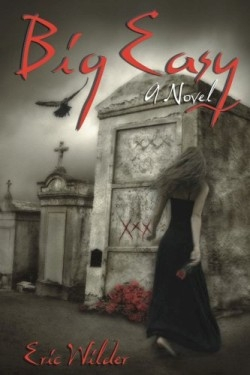
Big Easy
Forget it Jake — it’s Chinatown. —Robert Towne Chinatown screenplay 1973
Not far into Eric Wilder’s New Orleans crime and voodoo novel Big Easy the underlying structure begins to strongly suggest that of a screenplay. Utilizing cinematic elements such as definite division of acts major plot points as foundational anchors and a visual emphasis the story materializes as a loose homage to one film in particular—a choice largely to do with mood and inspiration. Thankfully the picture in question is of top quality and isn’t Gigli or Ernest Goes to Camp.
This book is rich in Nawlins-specific content which informs the plot and stimulates the senses. Hurricane Katrina has left a lingering residue: “…the smell of garbage dead fish and mildew.” Still the place remains a unique showcase for great food and rolling good times. But the resurrected half-empty Big Easy is still a dangerous place. There are no Puritans left in town. Homeless women are being ritualistically killed and NOPD detective Tony Nicosia with Wyatt Thomas a teetotaler of nebulous profession living in a bar must determine who’s responsible.
Tulane literature professor and mambo priestess Mama Mulate is a fount of information and an untraditional love interest. Wyatt is attracted to both Mama and Celeste Duples the innocent out-of-town visitor who is reminiscent of Chinatown’s Katherine Mulwray. Mama and Celeste very drunk in thin nighties playfully tease the extremely married Nicosia in an amusing scene: “‘I love you ladies but you’re not only going to get me fired you’re going to get me killed. Please have mercy. I’m too weak to resist.’
Cuervo ganja and Nicosia’s words sent the two gorgeous women into yet another fit of laughter.“
Big Easy place descriptions are authentic the dialogue is often witty and the copy is pretty clean. When the characters go to dinner readers will get hungry. Voodoo sequences seems to reflect a native knowledge. Mama Mulate’s fast cycles of anger and apology are a bit irrational. The author chooses to tell this story from mixed points of view. Wyatt’s sections are first person all others are third person with varying degrees of omniscience. The focus is divided the true center is challenging to pin down. Neither Wyatt’s threads nor Nicosia’s dominate the story enough to declare one the definite protagonist.
Eric Wilder is a petroleum geologist in Oklahoma who hails from Louisiana. He’s published five works of fiction including Ghost of a Chance and a volume of poetry. Readers with an affinity for this book’s characters can reconnect with several of them in Wilder’s short story collection Murder &201;touffée*. The author may be positioning himself for a shot at Hollywood. He already knows what to say to someone disillusioned by a milieu of mysticism and corruption: “Forget about it Wyatt. It’s the Big Easy.”
Disclosure: This article is not an endorsement, but a review. The publisher of this book provided free copies of the book and paid a small fee to have their book reviewed by a professional reviewer. Foreword Reviews and Clarion Reviews make no guarantee that the publisher will receive a positive review. Foreword Magazine, Inc. is disclosing this in accordance with the Federal Trade Commission’s 16 CFR, Part 255.
